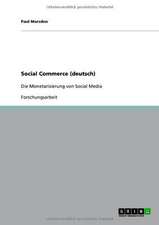Marketing the Third Reich: Persuasion, Packaging and Propaganda: Routledge Studies in Fascism and the Far Right
Autor Nicholas O'Shaughnessyen Limba Engleză Paperback – 21 sep 2017
Marketing the Third Reich explores the insidious connection between a mass culture and a political movement, and how the cultures of consumption and politics influence and infect each other – consumerised politics and politicised consumption. Ultimately its concern is with the ‘engineering of consent’ – the troubling matter of how public opinion can be manufactured, and governments elected, via sophisticated methodologies of persuasion developed in the consumer economy. Nazism functioned as a brand, packaging almost everything with persuasive purpose.
Revealing obvious parallels between Adolf Hitler’s use of the living theatre of politics, and our present public–political dramaturgy, between Nazi lies and our post-truth, the book raises the chilling question: was Hitler ahead of his time? This radical, original, in-depth study will be an invaluable resource for all scholars of marketing history, political marketing, propaganda and history.
| Toate formatele și edițiile | Preț | Express |
|---|---|---|
| Paperback (1) | 245.51 lei 6-8 săpt. | +72.37 lei 6-12 zile |
| Taylor & Francis – 21 sep 2017 | 245.51 lei 6-8 săpt. | +72.37 lei 6-12 zile |
| Hardback (1) | 759.80 lei 6-8 săpt. | |
| Taylor & Francis – 21 sep 2017 | 759.80 lei 6-8 săpt. |
Din seria Routledge Studies in Fascism and the Far Right
- 26%
 Preț: 761.63 lei
Preț: 761.63 lei - 14%
 Preț: 760.19 lei
Preț: 760.19 lei - 26%
 Preț: 759.80 lei
Preț: 759.80 lei - 17%
 Preț: 238.69 lei
Preț: 238.69 lei - 26%
 Preț: 764.23 lei
Preț: 764.23 lei -
 Preț: 256.40 lei
Preț: 256.40 lei - 26%
 Preț: 760.71 lei
Preț: 760.71 lei - 26%
 Preț: 758.94 lei
Preț: 758.94 lei - 26%
 Preț: 762.60 lei
Preț: 762.60 lei - 26%
 Preț: 759.80 lei
Preț: 759.80 lei - 15%
 Preț: 244.56 lei
Preț: 244.56 lei - 17%
 Preț: 244.90 lei
Preț: 244.90 lei - 13%
 Preț: 296.88 lei
Preț: 296.88 lei - 17%
 Preț: 247.33 lei
Preț: 247.33 lei - 17%
 Preț: 248.40 lei
Preț: 248.40 lei - 26%
 Preț: 759.80 lei
Preț: 759.80 lei - 26%
 Preț: 704.25 lei
Preț: 704.25 lei - 17%
 Preț: 244.14 lei
Preț: 244.14 lei - 26%
 Preț: 761.83 lei
Preț: 761.83 lei - 23%
 Preț: 319.62 lei
Preț: 319.62 lei - 16%
 Preț: 252.96 lei
Preț: 252.96 lei - 17%
 Preț: 245.97 lei
Preț: 245.97 lei - 17%
 Preț: 245.51 lei
Preț: 245.51 lei - 26%
 Preț: 759.80 lei
Preț: 759.80 lei - 26%
 Preț: 761.01 lei
Preț: 761.01 lei - 26%
 Preț: 759.80 lei
Preț: 759.80 lei - 26%
 Preț: 764.03 lei
Preț: 764.03 lei - 17%
 Preț: 247.09 lei
Preț: 247.09 lei - 26%
 Preț: 762.64 lei
Preț: 762.64 lei - 26%
 Preț: 843.33 lei
Preț: 843.33 lei - 13%
 Preț: 323.49 lei
Preț: 323.49 lei - 26%
 Preț: 759.90 lei
Preț: 759.90 lei - 26%
 Preț: 759.80 lei
Preț: 759.80 lei - 26%
 Preț: 759.80 lei
Preț: 759.80 lei - 26%
 Preț: 759.80 lei
Preț: 759.80 lei - 17%
 Preț: 258.01 lei
Preț: 258.01 lei - 26%
 Preț: 759.80 lei
Preț: 759.80 lei
Preț: 245.51 lei
Preț vechi: 296.10 lei
-17% Nou
Puncte Express: 368
Preț estimativ în valută:
46.99€ • 49.57$ • 39.16£
46.99€ • 49.57$ • 39.16£
Carte tipărită la comandă
Livrare economică 03-17 ianuarie 25
Livrare express 28 noiembrie-04 decembrie pentru 82.36 lei
Preluare comenzi: 021 569.72.76
Specificații
ISBN-13: 9781138060586
ISBN-10: 1138060585
Pagini: 304
Ilustrații: 34 Halftones, black and white; 34 Illustrations, black and white
Dimensiuni: 156 x 234 x 25 mm
Greutate: 0.43 kg
Ediția:1
Editura: Taylor & Francis
Colecția Routledge
Seria Routledge Studies in Fascism and the Far Right
Locul publicării:Oxford, United Kingdom
ISBN-10: 1138060585
Pagini: 304
Ilustrații: 34 Halftones, black and white; 34 Illustrations, black and white
Dimensiuni: 156 x 234 x 25 mm
Greutate: 0.43 kg
Ediția:1
Editura: Taylor & Francis
Colecția Routledge
Seria Routledge Studies in Fascism and the Far Right
Locul publicării:Oxford, United Kingdom
Public țintă
PostgraduateCuprins
Table of Contents
Introduction. Part I Advocacy: The Nazi Brand and its Protagonists 1. Was there a Nazi brand? 2. The marketing managers of the Third Reich: A chaos theory of government Part II Operational: Implementing the Nazi Brand 3. Promotion: political marketing communication- The Ministry of Illusion 4. Product: Adolf Hitler, The Ersatz Kaiser 5. Packaging: The politics of consumption and the consumption of politics 6. Place: Political marketing channels, the entrepreneurship of the public space Part III Legacy: The Implications of the Nazi Brand 7. Hitler our contemporary: Brand heritage, the Reich as power brand 8. Was Adolf Hitler ahead of his time? A review of comparative self-presentation Epilogue: The Führer and the Donald: the ghost of a resemblance?
Introduction. Part I Advocacy: The Nazi Brand and its Protagonists 1. Was there a Nazi brand? 2. The marketing managers of the Third Reich: A chaos theory of government Part II Operational: Implementing the Nazi Brand 3. Promotion: political marketing communication- The Ministry of Illusion 4. Product: Adolf Hitler, The Ersatz Kaiser 5. Packaging: The politics of consumption and the consumption of politics 6. Place: Political marketing channels, the entrepreneurship of the public space Part III Legacy: The Implications of the Nazi Brand 7. Hitler our contemporary: Brand heritage, the Reich as power brand 8. Was Adolf Hitler ahead of his time? A review of comparative self-presentation Epilogue: The Führer and the Donald: the ghost of a resemblance?
Notă biografică
Nicholas O’Shaughnessy is Professor of Communication at Queen Mary University of London, UK and latterly director of their Marketing and Communications Group; Visiting Professor in the Department of War Studies at King’s College London, and a Quondam Fellow of Hughes Hall Cambridge. He has written and edited numerous books on commercial and political persuasion, including Politics and Propaganda; Weapons of Mass Seduction and most recently Selling Hitler: Propaganda and the Nazi Brand.
Recenzii
"Nicholas O’Shaughnessy has come up with an incisive and intriguing way of looking at the Third Reich through its fiendishly effective brand marketing. The methods of Joseph Goebbels’ sinister genius at PR is laid bare superbly, and this book is replete with fascinating and important lessons for the present day."
Professor Andrew Roberts, Author, The Storm of War
""Only first class business and that in a first class way " was a motto of David Ogilvy. But what if the product and clients were loathsome? Like a barrister's advocacy the power of brilliant marketing can serve a false and perverse master. Never has this been truer than in the case of the Third Reich. Nicholas O'Shaughnessy's extraordinary book shows how it set out to be a well-managed brand and previewed many of the techniques of modern marketing communications in a sedulously first class way."
Miles Young, Non Executive Chairman, Ogilvy and Mather Worldwide
"This is an accomplished, rare, interdisciplinary text. It provides an historical overview of how one of the most heinous regimes in history used prototype marketing and propaganda to gain and retain power. It’s a must-read both for those who would wish to govern us and those who are governed alike."
Professor Paul Baines, Cranfield University, UK
"Professor O'Shaughnessy has found an innovative new way of examining the Third Reich, by looking closely at how it was sold and marketed."
Giles MacDonogh, Writer and Historian
"Nicholas O'Shaughnessy's elegant and detailed historical scholarship has previously drawn our attention to unsettling traces of brand marketing strategy behind the calamitous rise of Adolf Hitler and the Nazis. In Marketing the Third Reich he emboldens his thesis to show that the Nazis were ineluctably masters of marketing. He challenges conventional wisdom in both political history and in marketing scholarship by arguing that both are swayed by the nebulous yet compelling techniques of mass persuasion. In our propagandistic era of tumultuous political populism, this penetrating work is alarmingly resonant."
Professor Chris Hackley, Royal Holloway University of London, UK
Professor Andrew Roberts, Author, The Storm of War
""Only first class business and that in a first class way " was a motto of David Ogilvy. But what if the product and clients were loathsome? Like a barrister's advocacy the power of brilliant marketing can serve a false and perverse master. Never has this been truer than in the case of the Third Reich. Nicholas O'Shaughnessy's extraordinary book shows how it set out to be a well-managed brand and previewed many of the techniques of modern marketing communications in a sedulously first class way."
Miles Young, Non Executive Chairman, Ogilvy and Mather Worldwide
"This is an accomplished, rare, interdisciplinary text. It provides an historical overview of how one of the most heinous regimes in history used prototype marketing and propaganda to gain and retain power. It’s a must-read both for those who would wish to govern us and those who are governed alike."
Professor Paul Baines, Cranfield University, UK
"Professor O'Shaughnessy has found an innovative new way of examining the Third Reich, by looking closely at how it was sold and marketed."
Giles MacDonogh, Writer and Historian
"Nicholas O'Shaughnessy's elegant and detailed historical scholarship has previously drawn our attention to unsettling traces of brand marketing strategy behind the calamitous rise of Adolf Hitler and the Nazis. In Marketing the Third Reich he emboldens his thesis to show that the Nazis were ineluctably masters of marketing. He challenges conventional wisdom in both political history and in marketing scholarship by arguing that both are swayed by the nebulous yet compelling techniques of mass persuasion. In our propagandistic era of tumultuous political populism, this penetrating work is alarmingly resonant."
Professor Chris Hackley, Royal Holloway University of London, UK
Descriere
Political systems and ideologies express the society in which they are incubated. This book analyses how, in Nazi Germany, propaganda and political marketing existed not merely as an instrument of government, as with other regimes, but the very medium through which government governed. With obvious parallels drawn between Adolf Hitler’s use of the living theatre of politics and today's dramaturgy, a frightening question is raised. Was Adolf Hitler ahead of his time?
It will be an invaluable resource for all scholars of marketing history, political marketing, propaganda and history.
It will be an invaluable resource for all scholars of marketing history, political marketing, propaganda and history.










